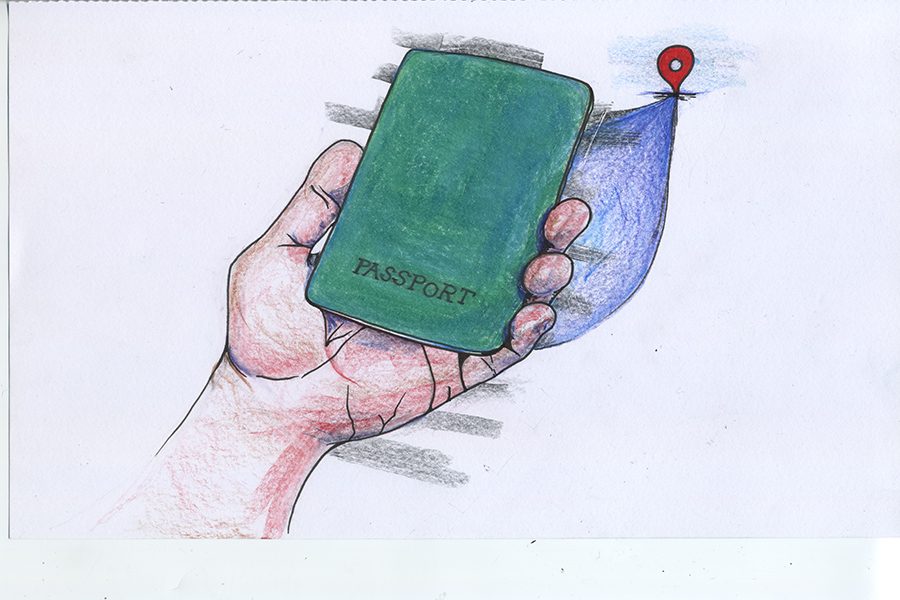Transportation troubles
International students lack access to Evansville
February 21, 2018
Transportation is not as easy as it may seem for some students on campus.
Many students are not comfortable with driving or simply do not have a car. It is even more difficult for international students who are traveling abroad in the United States and do not have a U.S. license. Loc Duong, a student from Vietnam who is majoring in public administration and finishing his fifth semester, said although he has recently earned a license and has a vehicle, he emphasized that international students have trouble with getting around off campus.
“When I came to the U.S., I recognized right away that transportation was a disadvantage,” he said. Duong has been attending USI for two years, having started in the spring of 2016.
Along with other vehicle-less students, Duong said he feels the process of getting around off campus is too much of a hassle. Usually, the process of going somewhere outside of campus is too complicated or takes too long. If they have no way of carpooling or driving, international students as well as students without a car have to wait for the METS West Connection shuttle bus that connects with USI to transfer them to the Schnucks Shopping Center, and then they have to wait longer for another bus to take them towards the Eagle Plaza, and then wait for a bus once again to ride back to campus.
The METS West Connection shuttle bus runs only on weekdays from Monday to Friday, 7:15 a.m. until 9 p.m. The shuttle bus does not run on the weekends, which prevents some students from going out and having fun during the days they don’t have classes. If a student wishes to travel somewhere outside of Evansville, the only way is to take a Greyhound bus. To visit his family in Michigan, Duong said it takes around twenty-nine hours for Duong to travel, along with having to stay a night in Louisville.
“Sometimes it takes an hour and a half just to get downtown,” he said. “We have to wait in the cold, and it makes us not want to take the bus and then it takes another bus to go from downtown to the mall, so it takes even more waiting in the cold.”
Fourth-year Japanese exchange students Jun Kanazawa and Shintaro Sato said they usually have to ask for friends to give them rides. In Japan, it is often frequent for students to get place to place by bicycle, but Sato, an education major, thinks Evansville proves to be difficult for people on bikes, so they have to rely on carpooling or the buses.
“I’m scared of using buses from campus,” Kanazawa, an international studies major said. “If there was an easier way to go to stores like Walmart or maybe a sidewalk to get there, that’d be great.”
Duong said he is well aware of the frustrations and struggles of transportation for other students. Besides the shuttle buses, there is also the option of calling an Uber. Unlike other universities, USI does not have student discounts with Uber or a way for students to pay with their student accounts.
Along with other international students, Duong said he is trying to learn more about the transportation struggles students are having and how they can help resolve it.
“We are currently trying to work it out,” he said. “We’ve been doing surveys where we ask a couple questions about if students think transportation on campus is an issue. There is also one complaint that the students on campus pay around $120 for parking fees but there are students that do not have cars that also pay for it. It is an idea to ask if this money should be used for bringing transportation for the students without cars and in needs of rides.”
Nichole Vernon, program coordinator of the Center for International Programs, said she understands the transportation struggle for international students.
“There are some students who are at USI for a short period of time and of course are not going to look into getting a car due to their short time here,” she said. “We have some students from Pakistan and they have trouble going to a mosque because they don’t have a car. We see the need for transportation for international students every semester and we have been working with a few students trying to get discounts set up with Uber available for every student at USI.”
There is the potential option of taxis, but Vernon said she feels calling taxis may be troublesome for some students who need immediate, easy access. There is also the issue that some students may not have cellphones to call a taxi or Uber, and WiFi may sometimes be difficult to reach off of campus for students to be able to return to their dorms or apartments.
“People are aware of the problem, and here at the Center for International Programs, we talk one-on-one with the students and learn about their problems and try our best to help them out and support them,” Vernon said. “The issue is always present, so we are doing what we can to talk to students to try to work out the problem.”
On breaks, a school bus goes around campus every other Sunday and offers to take students around the mall and Target shopping area. During longer breaks, a van is driven around every two days to take students to Walmart and shopping at the mall, as well as to entertainment places such as bowling alleys and the movie theater.
Duong said he believes setting up carpooling systems could help students with transportation as well as resolve cost issues.
Duong and other international students are working with Assistant Provost for International Programs and Services Heidi Gregori-Gahan and Director of Housing Amy Price to come up with solutions to help students with transportation off campus. They often send out surveys for students to participate in and so they can learn more about student needs.
“This is a project we can all organize and make the issue more approachable,” he said.








